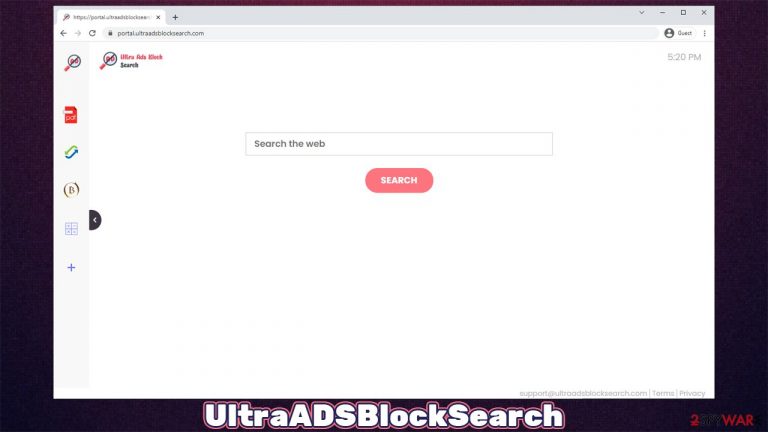UltraADSBlockSearch browser hijacker (Free Instructions)
UltraADSBlockSearch browser hijacker Removal Guide
What is UltraADSBlockSearch browser hijacker?
UltraADSBlockSearch is a useless browser extension that can't block ads

Unfortunately, not all extensions improve the quality of the web browsing experience – UltraADSBlockSearch is one of such disappointing applications. Belonging to the category of browser hijackers, it mostly spreads within software bundles or can be downloaded on various third-party websites, as well as random ads that one might encounter on various sites.
As soon as it is installed on the device, the changes occur immediately, although this does not become apparent to users until they open their browsers: the homepage and the new tab address are swapped to portal.ultraadsblocksearch.com, and a different search box appended. While, visually, this might seem just like another search box, it is not the case at all, as it greatly impacts the way users browse the web.
What we mean by this is that the search provider and search results are nothing like they used to be. Thus, if you have previously used google.com for your searches, the provider would now be swapped for another one, e.g., Yahoo, Bing, searchlee.com, or nearbyme.io. It goes without saying that the results are populated differently by different search engines, although this is not the biggest problem. The most frustrating issue is the ads that are inserted at the top.
These ads usually advertise something usual, such as a web browser or a retailer. However, not all the ads are trustworthy, as you might find links to questionable websites that promote suspicious software or advertise retailers of poor reputation. We do not recommend clicking these ads and exploring the promoted content for security reasons. Instead, check out our tips on how to get rid of the hijacker and make sure your system is clean.
| Name | UltraADSBlockSearch |
|---|---|
| Type | Browser hijacker |
| Distribution | Software bundle packages, fake updates, deceptive ads |
| Symptoms | Search results are filled with sponsored links and ads; homepage and new tab address is set to portal.ultraadsblocksearch.com; ads encountered more often than not; searches are redirected through an alternative provider |
| Dangers | Installation of other potentially unwanted programs, information disclosure to potentially unsafe parties, monetary losses |
| Uninstall | You can browser hijackers by following the manual guide below or by scanning the computer with powerful SpyHunter 5Combo Cleaner anti-malware |
| Optional steps | After you eliminate the hijacker, you should also clean your web browsers to avoid tracking and other issues. You can use FortectIntego as a quick solution |
Browser hijackers are not usually installed intentionally
Many people are surprised once they find their browser settings changed suddenly – these changes are always initiated by an application, be it an extension or a program installed on a system level. The reason for this mysterious appearance is not that mysterious after all: additional software is installed during the installation of freeware.[1]
Users commonly are very busy and often don't pay close attention to the installation instructions when they download an app. Instead, they skip through steps and click “Next” just for the process to be finished as soon as possible. Third-party app distributors are well aware of this, and they tend to abuse it quite often.
Software bundling is not illegitimate in any way – it is just the implementation by deceptive parties that makes it shady. Instead of showing people what is actually going to be installed before the process is finalized, various misleading techniques are used. For example, users might be encouraged to use Recommended/Quick settings instead of Advanced/Custom ones, which allows automatic installation of optional components. Fine print text, misplaced buttons, and similar things are commonly used as well.

Thus, when installing new software, especially if it comes from third parties, make sure you never rush through the installation steps and read the instructions carefully. Get rid of all the markings next to offers and always choose the Advanced option if one is provided – it allows you to stay in control of what is being installed on your device.
Remove the potentially unwanted app and clean web browsers thoroughly
UltraADSBlockSearch spreads as a browser extension, so you should look at the browser settings to get rid of it. This process should not be difficult, although if you have never dealt with it, we provide detailed instructions below. Before you proceed, however, we strongly recommend you employ SpyHunter 5Combo Cleaner, Malwarebytes, or another powerful anti-malware and perform a full system scan to ensure that no malicious processes or programs are running in the background. This is especially important if you frequent high-risk websites or found apps installed without initiating the process yourself.
Google Chrome
- Open Google Chrome, click on the Menu (three vertical dots at the top-right corner) and select More tools > Extensions.
- In the newly opened window, you will see all the installed extensions. Uninstall all the suspicious plugins that might be related to the unwanted program by clicking Remove.

Mozilla Firefox
- Open Mozilla Firefox browser and click on the Menu (three horizontal lines at the window's top-right).
- Select Add-ons.
- In here, select the unwanted plugin and click Remove.

MS Edge (Chromium)
- Open Edge and click select Settings > Extensions.
- Delete unwanted extensions by clicking Remove.

Safari
- Click Safari > Preferences…
- In the new window, pick Extensions.
- Select the unwanted extension and select Uninstall.

Every time you visit a website, various information about you is collected: the IP address, approximate location, language and browser preferences, your previously visited websites, etc. While this might sound very intrusive, it became the norm on the internet, as anonymous data collected can serve a good purpose. For example, when you enter your login information on social media, you don't have to do so every time you decide to visit – that is, thanks to cookies.
However, this practice also poses some dangers, as session hijacking[2] is well-known to be the reason why users' login details might be stolen. It is worth noting that this issue can only occur if you have vulnerable[3] software or malware installed on your system (which highlights the need to update all your software on the system on time), but it is a threat nonetheless. To mitigate this, security researchers advise users to clean web browser caches from time to time, especially after the elimination of potentially unwanted programs, as these can be set to rather more than that.
In order to effectively remove web data, you should access your browser settings. If you would rather avoid doing it manually, we have a solution for you – FortectIntego. The app can clean browsers and system junk with just one click, and also fix any system damage, regardless of whether it is related to virus infections or not.
Google Chrome
- Click on Menu and pick Settings.
- Under Privacy and security, select Clear browsing data.
- Select Browsing history, Cookies and other site data, as well as Cached images and files.
- Click Clear data.

Mozilla Firefox
- Click Menu and pick Options.
- Go to Privacy & Security section.
- Scroll down to locate Cookies and Site Data.
- Click on Clear Data…
- Select Cookies and Site Data, as well as Cached Web Content and press Clear.

MS Edge
- Click on Menu and go to Settings.
- Select Privacy and services.
- Under Clear browsing data, pick Choose what to clear.
- Under Time range, pick All time.
- Select Clear now.

Safari
- Click Safari > Clear History…
- From the drop-down menu under Clear, pick all history.
- Confirm with Clear History.

UltraADSBlockSearch is just a copy of its previous versions
Some people might believe that an app called UltraADSBlockSearch can be useful when it comes to blocking ads. Indeed, ad-blockers are extremely useful, as they can prevent intrusive pop-ups and other advertisements, and can also stop malicious scripts from being executed automatically upon website entry. However, if you are looking for this functionality, this browser extension has none of that.
In fact, it belongs to the broader family of browser hijackers that have been spreading around for several years now. The previous versions of the app, StreamUltraSearch, PDFConverterSearchNow, or MyAdBlocksSearch are, in fact, look suspiciously similar to one another.
Instead, users are presented with an alternative search provider so that fake search results would be generated – this guarantees quick profits for the authors. In the meantime, besides the basic search function and a few widgets (calculator, currency converter), there is nothing else that the extension offers.
It simply comes down to the fact that each of these applications is mere copies of their previous versions, rebranded by the developers and released as new apps. This is done in order to avoid detection by security software or bad reputation (there is a reason why the developer of these apps remains unknown). In the meantime, no innovation or features are added, all while the initial function of the extension provides little to no benefits for users.
How to prevent from getting browser hijacker
Stream videos without limitations, no matter where you are
There are multiple parties that could find out almost anything about you by checking your online activity. While this is highly unlikely, advertisers and tech companies are constantly tracking you online. The first step to privacy should be a secure browser that focuses on tracker reduction to a minimum.
Even if you employ a secure browser, you will not be able to access websites that are restricted due to local government laws or other reasons. In other words, you may not be able to stream Disney+ or US-based Netflix in some countries. To bypass these restrictions, you can employ a powerful Private Internet Access VPN, which provides dedicated servers for torrenting and streaming, not slowing you down in the process.
Data backups are important – recover your lost files
Ransomware is one of the biggest threats to personal data. Once it is executed on a machine, it launches a sophisticated encryption algorithm that locks all your files, although it does not destroy them. The most common misconception is that anti-malware software can return files to their previous states. This is not true, however, and data remains locked after the malicious payload is deleted.
While regular data backups are the only secure method to recover your files after a ransomware attack, tools such as Data Recovery Pro can also be effective and restore at least some of your lost data.
- ^ Tim Fisher. What Is Freeware?. Lifewire. Tech News, Reviews, Help & How-Tos.
- ^ Session hijacking. Wikipedia. The free encyclopedia.
- ^ Thomas Holt. What Are Software Vulnerabilities, and Why Are There So Many of Them?. Scientific American. Popular Science Magazine.
